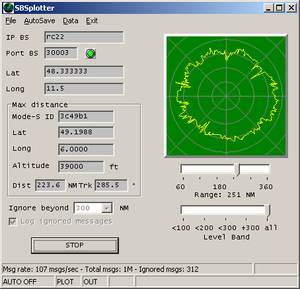Radarcape:Software Features: Difference between revisions
| Line 368: | Line 368: | ||
If enabled, FLARM data can be output using one of two options: | If enabled, FLARM data can be output using one of two options: | ||
* FLARM data will be output using a <code>MSG,3</code> message, which will be indistinguishable from a <code>MSG,3</code> message | * FLARM data will be output using a <code>MSG,3</code> message, which will be indistinguishable from a <code>MSG,3</code> message generated after reception of a Mode-S frame | ||
* FLARM data will be output using a newly introduced <code>MSG,9</code> message, which contains only data received via FLARM | * FLARM data will be output using a newly introduced <code>MSG,9</code> message, which contains only data received via FLARM | ||
Revision as of 07:36, 12 July 2021
Radarcape/Air!Squitter Software Features
The Radarcape provides output of data in several levels:
- true raw data
- decoded data on a per frame basis (e.g., port 30003)
- decoded data on summary basis (e.g., aircraftlist.json, deltadb.txt)
- web browser support (aircraft list, 2D map)
- 3D output (live KML data)
Web Based Aircraft Table
A list of received aircraft can be fetched via a build-in Web server. This list can be sorted ascending and descending in each column by simply clicking on the arrows. The distances are automatically calculated from aircraft positions and your GPS coordinates.
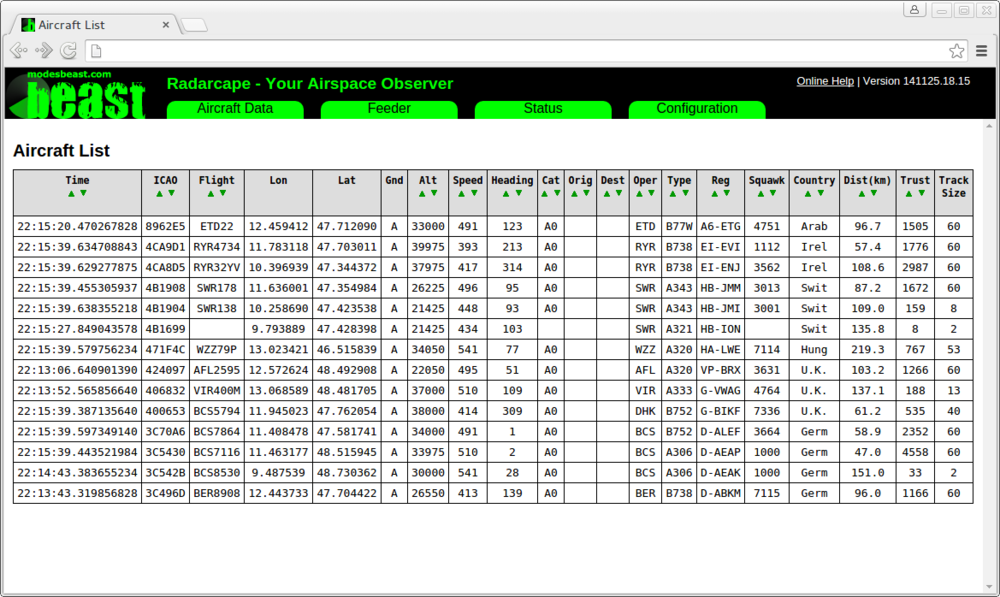
| Name | Description | Notes |
| Time (hh:mm:ss:ns) | Time of last message received from the aircraft | |
| ICAO | 24 bit ICAO hex ID unique identification of aircraft | |
| Flight | the Call Sign as it is transmitted from the aircraft itself | |
| Lon | Longitude | |
| Lat | Latitude | |
| Src | Source of Lat/Lon: A=ADSB M=MLAT | |
| GndAir | Aircraft is on ground (identified with GND bit or DF-18 messages) or airborne | |
| Alt | Altitude (feet) at 1013 mb | |
| VRate | Vertical rate in feet/min | |
| Speed | Ground Speed in knots | |
| Track | Direction that the aircraft is travelling in degrees true | |
| Cat | Cat A0..C5 are transmitted by aircraft in Mode-S messages | |
| Orig | Origin of flight | taken from database, perform Maintenance -> Update flight routes database |
| Destin | Destination of flight | taken from database, perform Maintenance -> Update flight routes database |
| Oper | Flight operator | taken from database, perform Maintenance -> Update flight routes database |
| Type | Aircraft Type | taken from database, perform Maintenance -> Update flight routes database |
| Reg | Registration of aircraft | taken from database, perform Maintenance -> Update base station database |
| Squawk | Squawk code as it is transmitted by aircraft in Mode-S messages | |
| Country | Country that the aircraft is registered for, indicated through the upper bits in the ICAO hex id | |
| Distance | Distance to the observer if its Lat, Lon is either valid by manual entry in configuration or determined by GPS | |
| Trust | Number of highly trustable DF-11 or DF-17/18 messages per aircraft. Used to desinguish ghosts, as true aircraft quickly raise this number while ghosts stay at 1 | |
| Track Size | Length of the track in 2D 3D display in 5sec sequence track points |
Live 2D Output
All received aircrafts with a known position are displayed on a 2D map in your Web browser.
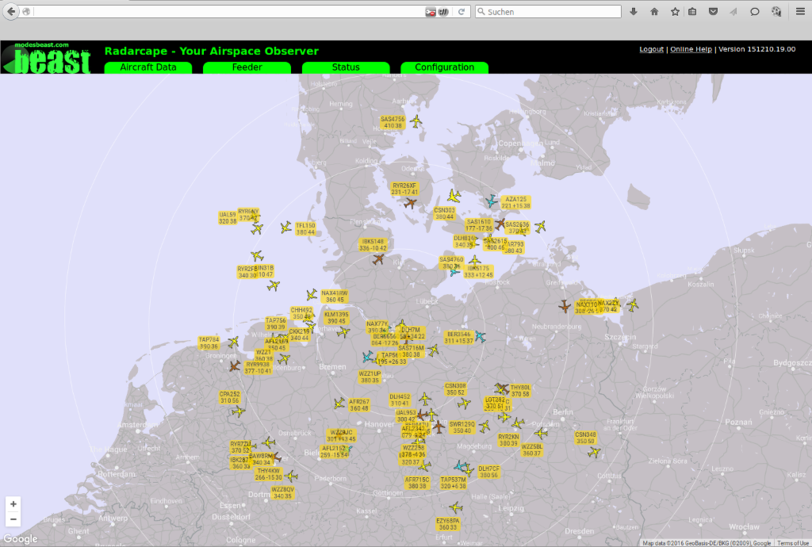
Live 3D Output (KML/KMZ Output)
Google Earth can be attached to the Radarcape via KML/KMZ files.
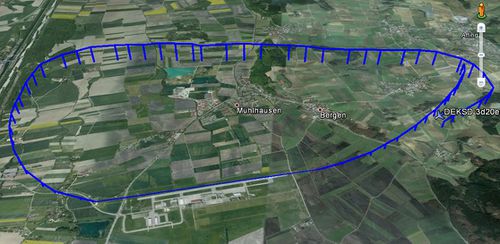
An aircraft over Augsburg Airport
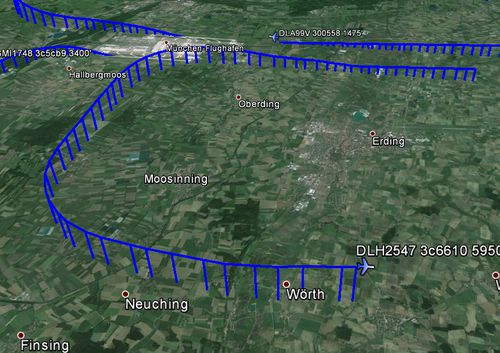
DeltaDB Service
The DeltaDB service can be accessed via http://radarcape/deltadb.txt. It outputs a comma separated list of all changes in the internal aircraft list since the last call or a specified time. This is an efficient replacement of port 30003 functionalities.
Aircraft List JSON Service
All data contained in the aircraft list can also be downloaded in JavaScript Object Notation (JSON). The file format can be used by other applications to access aircraft list data using the Hyper Text Transfer Protocol (HTTP) protocol.
The Aircraftlist JSON Service can be accessed via http://radarcape/aircraftlist.json.
The JSON output uses abbreviated identifiers for the data fields like below.
Note: Fields for which no data have been received might either be absent from the JSON, or set to "null". You should not expect all fields to be always available
| Abbreviation | Description | Minimum required ADS-B version (MOPS) | Additional Information |
|---|---|---|---|
| uti | Time of last message: Seconds since UNIX epoch | ||
| ns | Time of last message: Nanoseconds since Second epoch | ||
| hex | ICAO Mode-S or Flarm ID, in Hex format | Uppercase for Mode-S and Flarm, lowercase for TIS-B | |
| fli | Flight Identification | From ADS-B or BDS2,0 as specified on ICAO Annex 10, Volume IV, Table 3-9; "?" when A/C reports loss of interface | |
| ava | Flight data: available sources | One letter per available source. A=ADSB, M=Jetvision MLAT, F=FlightAware MLAT, O=OGN, L=FLARM | |
| src | Flight data: Source | The current preferred/selected source | |
| lat | Flight data: Latitude (-90 to 90º) | ||
| lon | Flight data: Longitude (-180 to 180º) | ||
| spd | Flight data: Ground Speed (kt) | ||
| trk | Flight data: True track (0-360º) | ||
| vrt | Flight data: Vertical Rate (ft/min) | ||
| alt | Flight data: Barometric uncalibrated altitude (ft) | ||
| gda | Airborne/Ground | G for on ground, A for airborne (if TIS-B then lowercase g or a) | |
| cat | Aircraft category | As reported in ADS-B or FLARM. See table below. | |
| org | Origin | Origin airport from Flighroutes database | |
| dst | Destination | Destination airport from Flighroutes database | |
| opr | Operator | Operator from Basestation database | |
| typ | Type | Type from Basestation database | |
| reg | Registration | Registration from Basestation database or if not available automatically deduced for some countries with known mapping (FR, BE, PT, CH, US and CA) | |
| squ | Mode-A (Squawk) | While this is a Mode-A code, it can only be correlated in Mode-S targets. Mode-A or Mode-AC targets are not displayed in decoded formats | |
| cou | Country | According to Mode-S allocation block | |
| dis | Distance (km or NM depending on configuration) | To the Receiver GNSS location | |
| tru | Trust count | Number of Mode-S frames successfully decoded from this A/C. Statistically it's possible that for a very low count the A/C does not actually exist | |
| dbm | Approximate signal level in dBm | ||
| lla | Age of last Position (s) | ||
| tmp | Temperature (ºC) | 0 | Synthetic value calculated from several fields. Might not be always reliable |
| wsp | Wind Speed (kt) | 0 | Synthetic value calculated from several fields. Might not be always reliable |
| wdi | Wind from Direction (0-360º) | 0 | Synthetic value calculated from several fields. Might not be always reliable |
| mop | ADS-B MOPS version | null=no ADS-B frames received, 0=default for unconfirmed version, 1 or 2 for corresponding confirmed version | |
| spi | SPI (Squawk ident) | ||
| alr | Alert status | 0=no alert, 1=temporary (Squawk changed previous 18s), 2=mode-s alert, 3=permanent (Squawk 7500,7600,7700). Since Mode-S DF4,5,20,21 do not distinguish between temporary and permanent alert, the value 2 is used to mean either 1 or 3 and happens for non ADS-B A/C targets | |
| ias | IAS | 0 | Typically not reported by a fully operational A/C as by default only Ground speed and True track are transmitted |
| tas | TAS | 0 | Typically not reported by a fully operational A/C as by default only Ground speed and True track are transmitted |
| hdgm | Magnetic Heading | 0 | Typically not reported by a fully operational A/C as by default only Ground speed and True track are transmitted |
| hdgt | True Heading | 0 | Calculated with declination when Magnetic Heading and Location are available |
| qnhs | Selected QNH | 2 | Actual value entered by the A/C crew |
| alts | Selected Altitude | 2 | Actual value entered by the A/C crew |
| hdgs | Selected Heading | 2 | Actual value entered by the A/C crew |
| altg | GNSS elipsoidal altitude (ft) | 0 | Either directly reported or from baro+difference |
| pic | Asterix PIC | 0 | EUROCONTROL-SPEC-0149-12 (ASTERIX Cat 021 Ed 2.4) Page 28 |
| tcm | ACAS/TCAS status | 0, alert only 2 | 0=not operational, 1=operational, 2=alert |
| ape | Autopilot engaged | 2 | |
| sil | ADS-B SIL | 1 | |
| sda | ADS-B SDA | 2 | |
| nacp | ADS-B NACp | 1 |
Aircraft categories
| Code | Type | Description |
|---|---|---|
| A1 | ADS-B | Light (< 15500 lbs) |
| A2 | ADS-B | Small (15500 >= lbs < 75000) |
| A3 | ADS-B | Large (75000 >= lbs < 300000) |
| A4 | ADS-B | Large (high vortex) |
| A5 | ADS-B | Heavy (>= 300000 lbs) |
| A6 | ADS-B | High performance |
| A7 | ADS-B | Rotorcraft |
| B1 | ADS-B | Glider/Sailplane |
| B2 | ADS-B | Lighter than air |
| B3 | ADS-B | Parachutist/Skydiver |
| B4 | ADS-B | Ultralight/Hang glider/Paraglider |
| B6 | ADS-B | UAV |
| B7 | ADS-B | Space/Trans-atmospheric vehicle |
| C1 | ADS-B | Surface vehicle - emergency |
| C2 | ADS-B | Surface vehicle - service |
| C3 | ADS-B | Obstacle - point |
| C4 | ADS-B | Obstacle - clustter |
| C5 | ADS-B | Obstacle - line |
| A0 | ADS-B | No category information |
| B0 | ADS-B | No category information |
| C0 | ADS-B | No category information |
| F0 | FLARM | None |
| F1 | FLARM | Glider/Motor glider |
| F2 | FLARM | Tow/Tug plane |
| F3 | FLARM | Helicopter/Rotorcraft |
| F4 | FLARM | Skydiver |
| F5 | FLARM | Skydiver/Drop plane |
| F6 | FLARM | Hang glider |
| F7 | FLARM | Paraglider |
| F8 | FLARM | Aircraft reciprocating |
| F9 | FLARM | Aircraft jet turboprop |
| F11 | FLARM | Balloon |
| F12 | FLARM | Airship |
| F13 | FLARM | UAV |
| F15 | FLARM | Static |
Raw Data Streaming to Network (TCP and UDP)
The binary and AVR raw data formats are identical to those of the Mode-S Beast and documented in Mode-S_Beast:Data_Output_Formats. For the Radarcape, there is one additional message that contains timestamp and FPGA configuration information, which is triggered by each 1PPS from the GPS module.
TCP or UDP port 10002
This is a CRC-checked mirror of the data as it comes from the FPGA, DF-11, DF-17 and DF-18 are CRC checked if enabled in FPGA. Includes Mode-A/C data with respect to the configuration setting.
TCP or UDP port 10003
Binary formatted raw data with all Modes-S data formats CRC-prechecked (eliminates transmission of the erroneous frames, reduces load on the network). All data from the FPGA is disassembled into messages and verified if correct.
TCP or UDP port 10004
Binary formatted raw data, pre-checked DF-11, DF-17 and DF-18 only: minimum load for the transmission path but contains most information. No Mode-A/C data.
TCP or UDP port 10005
Binary formatted raw data, only raw data frames of those aircraft where the location (latitude and longitude) is unknown. Used for special MLAT purposes. No Mode-A/C data.
Port 30003 Service (TCP, UDP, and USB-serial)
Port 30003 style output (e.g., for use with SBS Plotter) can be provided without the need of an additional application on your PC.
The Radarcape provides this data stream on TCP port 30003, UDP port 30003, and the serial USB interface.
The format of the data output can be found in this document
The date in Port 30003 messages is always the Linux system date.
The timestamp instead is a GPS timestamp when the configuration is set to GPS timestamps and system time when the Radarcape operates in legacy 12 MHz time stamp mode.
Due to the low efficiency and high processor load caused by this protocol, please do not use Port 30003 unless really necessary.
A better way of getting the same data is the deltaDB service.
On Linux, a very simple method how to access the TCP stream of Port 30003 is socat:
socat - TCP:radarcape:80
Output of FLARM data on port 30003
Starting with version 210406.1000.02, there is an option to also output FLARM frames on port 30003.
This can be configured on the web interface via Settings -> UDP Data Streaming Settings -> Port 30003 UDP Server -> Output Flarm data on Port 30003.
By default, there will be no FLARM data output on port 30003.
If enabled, FLARM data can be output using one of two options:
- FLARM data will be output using a
MSG,3message, which will be indistinguishable from aMSG,3message generated after reception of a Mode-S frame - FLARM data will be output using a newly introduced
MSG,9message, which contains only data received via FLARM
MSG,9 output format
The output format of the MSG,9 message is a combination the MSG,3 and MSG,4 messages.
MSG,9 messages contain all of the following fields in addition to the first ten common fields: Altitude, Ground Speed, Track, Latitude, Longitude, Vertical Rate and IsOnGround.
These messages will only be generated if enabled in the settings menu and will only contain data received via a local FLARM receiver.
USB Serial Port Data Access
While some features existed before, this feature is more reliable on Debian 10 . See Linux Distribution Versions History.
The device supports one selectable data stream out of following sources on a virtual serial port via the back side USB port:
- Raw FGPA data - including Mode-A/C data
- CRC pre-checked Mode-S with Mode-A/C data
- Mode-S Frame types DF-11, DF-17 and DF-18 only
- Mode-S Frames of all aircraft without a known location
- Port 30003 format
The output can be selected in the configuration menu. Due to processor load, it is recommended to keep this feature disabled when not required.
The setting can be changed on the fly and will apply without the need to reboot the device.
Note: On the Radarcape of 1st Generation two serial ports appear on the USB interface. One of them is a hardware serial port for debug
Note: When powering on, the external +5 V power supply MUST be connected prior to connecting the USB cable
The serial port uses a standard USB class driver and should install automatically in any Operating System that is currently supported.
